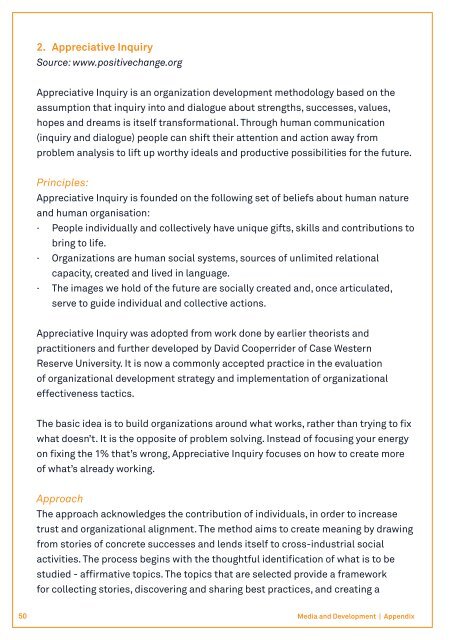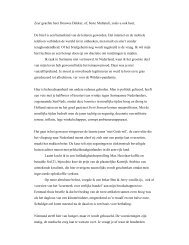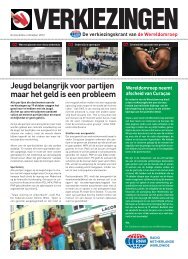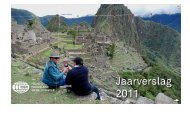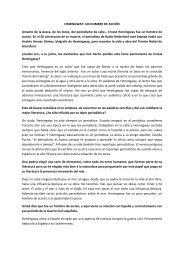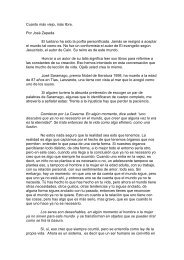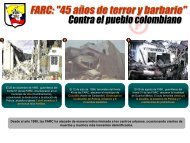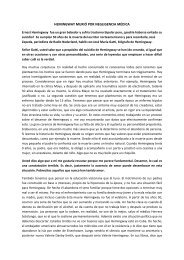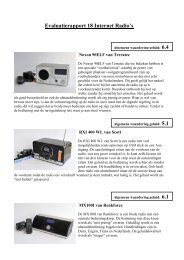Media and Development - RNW - Radio Netherlands Worldwide
Media and Development - RNW - Radio Netherlands Worldwide
Media and Development - RNW - Radio Netherlands Worldwide
Create successful ePaper yourself
Turn your PDF publications into a flip-book with our unique Google optimized e-Paper software.
50<br />
2. Appreciative Inquiry<br />
Source: www.positivechange.org<br />
Appreciative Inquiry is an organization development methodology based on the<br />
assumption that inquiry into <strong>and</strong> dialogue about strengths, successes, values,<br />
hopes <strong>and</strong> dreams is itself transformational. Through human communication<br />
(inquiry <strong>and</strong> dialogue) people can shift their attention <strong>and</strong> action away from<br />
problem analysis to lift up worthy ideals <strong>and</strong> productive possibilities for the future.<br />
Principles:<br />
Appreciative Inquiry is founded on the following set of beliefs about human nature<br />
<strong>and</strong> human organisation:<br />
· People individually <strong>and</strong> collectively have unique gifts, skills <strong>and</strong> contributions to<br />
bring to life.<br />
· Organizations are human social systems, sources of unlimited relational<br />
capacity, created <strong>and</strong> lived in language.<br />
· The images we hold of the future are socially created <strong>and</strong>, once articulated,<br />
serve to guide individual <strong>and</strong> collective actions.<br />
Appreciative Inquiry was adopted from work done by earlier theorists <strong>and</strong><br />
practitioners <strong>and</strong> further developed by David Cooperrider of Case Western<br />
Reserve University. It is now a commonly accepted practice in the evaluation<br />
of organizational development strategy <strong>and</strong> implementation of organizational<br />
effectiveness tactics.<br />
The basic idea is to build organizations around what works, rather than trying to fix<br />
what doesn’t. It is the opposite of problem solving. Instead of focusing your energy<br />
on fixing the 1% that’s wrong, Appreciative Inquiry focuses on how to create more<br />
of what’s already working.<br />
Approach<br />
The approach acknowledges the contribution of individuals, in order to increase<br />
trust <strong>and</strong> organizational alignment. The method aims to create meaning by drawing<br />
from stories of concrete successes <strong>and</strong> lends itself to cross-industrial social<br />
activities. The process begins with the thoughtful identification of what is to be<br />
studied - affirmative topics. The topics that are selected provide a framework<br />
for collecting stories, discovering <strong>and</strong> sharing best practices, <strong>and</strong> creating a<br />
<strong>Media</strong> <strong>and</strong> <strong>Development</strong> | Appendix<br />
knowledge-rich work environment. They become the organization’s agenda for<br />
learning <strong>and</strong> innovation.<br />
The process itself follows 4 stages in a cyclic movement : the 4D Cycle of Discovery,<br />
Dream, Design <strong>and</strong> Destiny.<br />
Discovery:<br />
The appreciative process begins by asking people to tell stories about their<br />
experiences with success <strong>and</strong> relate these stories to their dreams for the future.<br />
The storytelling captures individual experiences <strong>and</strong> aspirations in order to build<br />
<strong>and</strong> reinvent community. It gives way to a sharing <strong>and</strong> learning from best practices<br />
<strong>and</strong> a greatly enhanced organisational knowledge <strong>and</strong> collective wisdom.<br />
Dream:<br />
The Dream phase is an energizing exploration of “what might be:” a time for people<br />
to explore their hopes <strong>and</strong> dreams for their work, their working relationships, their<br />
organisation, <strong>and</strong> the world at large. It is a time for groups of people to engage in<br />
thinking big, thinking out of the box, <strong>and</strong> thinking out of the boundaries of what has<br />
been in the past.<br />
Design:<br />
The Design phase involves making choices about “what should be” within an<br />
organization or system. It is a conscious re-creation or transformation, through<br />
which such things as systems, structures, strategies, processes <strong>and</strong> images will<br />
become more fully aligned with the organization’s positive past (Discovery) <strong>and</strong><br />
highest potential (Dream).<br />
Destiny:<br />
The Destiny phase initiates a series of inspired actions that support ongoing<br />
learning <strong>and</strong> innovation - or “what will be.” The Destiny phase focuses specifically<br />
on personal <strong>and</strong> organizational commitments <strong>and</strong> paths forward. The result of<br />
destiny is generally an extensive array of changes <strong>and</strong> action plans.<br />
In many cases, the 4-D Cycle provides the framework for ongoing activities. Thus,<br />
the cycle begins again . . . <strong>and</strong> again . . . <strong>and</strong> again.<br />
Applications:<br />
There are a variety of approaches to implementing Appreciative Inquiry, including<br />
mass-mobilized interviews <strong>and</strong> a large, diverse gathering called an Appreciative<br />
Inquiry Summit (Ludema, Whitney, Mohr <strong>and</strong> Griffin, 2003). Both approaches involve<br />
Background information about the methodologies of future search <strong>and</strong> appreciative enquiry 51


